 Petzlover
Petzlover Havana Brown is originated from United Kingdom but Van Kedisi is originated from Turkey. Both Havana Brown and Van Kedisi are having almost same weight. Havana Brown may live 5 years less than Van Kedisi. Both Havana Brown and Van Kedisi has same litter size. Havana Brown requires Low Maintenance. But Van Kedisi requires Moderate Maintenance
Havana Brown is originated from United Kingdom but Van Kedisi is originated from Turkey. Both Havana Brown and Van Kedisi are having almost same weight. Havana Brown may live 5 years less than Van Kedisi. Both Havana Brown and Van Kedisi has same litter size. Havana Brown requires Low Maintenance. But Van Kedisi requires Moderate Maintenance
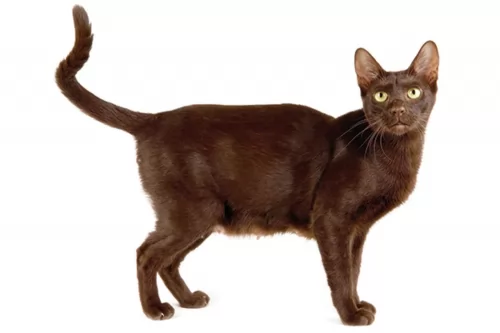 The rare Havana Brown cat seems to be a result of a planned breeding between Siamese and domestic black cats.
The rare Havana Brown cat seems to be a result of a planned breeding between Siamese and domestic black cats.
It was in the 1950s that cat fanciers in the UK became the early breeders. These breeders called themselves the Havana Group. They created the foundation of the modern-day Havana Brown cat.
These breeders managed to produce chocolate shaded kittens which became known as the Chestnut Brown Oriental. Kittens arrived in the US and were crossbred with the Chocolate and Seal Point Siamese to produce chocolate-colored kittens.
In 1964, the Havana Brown was accepted for Championship status by the Cat Fanciers Association.
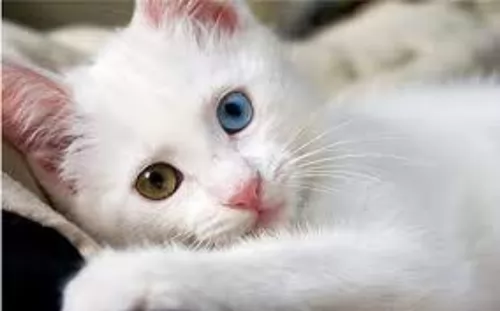 The Van Kedisi cat or Cat of Van as it is also known is a domestic cat that hails from the Lake Van region of Turkey.
The Van Kedisi cat or Cat of Van as it is also known is a domestic cat that hails from the Lake Van region of Turkey.
There are historians who agree that the domestic cat originated in Egypt. The actual cat was developed in the United Kingdom from a host of cat types from Turkey. During the late 1990s the Van Cat became an informal municipal symbol of the city.
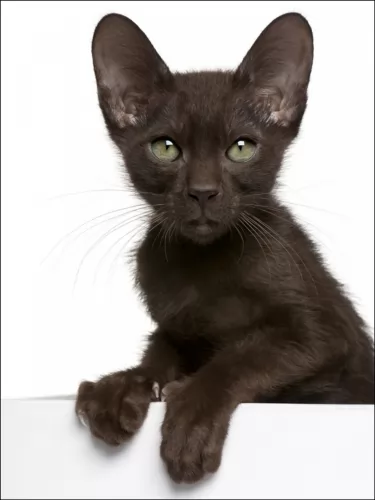 The Havana Brown is a medium-sized cat, being somewhat slender and weighing between 3 and 6kg. The body is long and muscular and the cat has a beautiful brown short to medium-length coat.
The Havana Brown is a medium-sized cat, being somewhat slender and weighing between 3 and 6kg. The body is long and muscular and the cat has a beautiful brown short to medium-length coat.
The coat color is in fact a rich reddish-brown shade. The ears are fairly large and round-shaped and the oval-shaped eyes are a beautiful green.
The Havana Brown is an intelligent, playful, curious cat who enjoys being in the company of its human family. They tend to gravitate towards one favorite family member.
They’re cats that don’t like being left alone for long periods of time. They get on well with children and he also won’t object to becoming friends with the family dog as well.
Friendly though they may be, they also enjoy spending some time on their own. Individual personalities vary but most are playful and talkative.
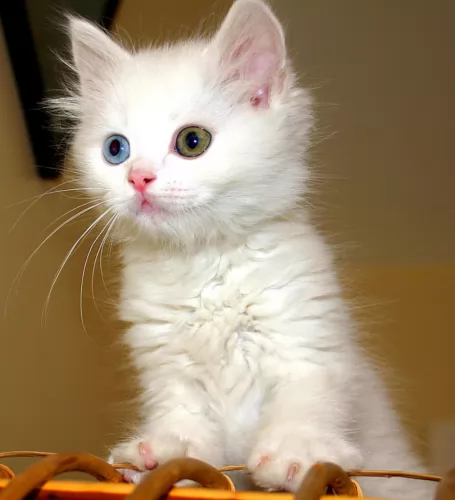 The Van Kedisi cat is a large feline with a soft, silky white coat, which he often sheds in the Summer. There is usually color on the head and tail – a yellow apricot color. The coat is descibed as seni-long.
The Van Kedisi cat is a large feline with a soft, silky white coat, which he often sheds in the Summer. There is usually color on the head and tail – a yellow apricot color. The coat is descibed as seni-long.
He can reach up to 10kg in weight. The cats are lean and long-legged and they also like to swim. The eyes are almond-shaped eyes and are often odd-colored. One eye might be green and the other blue.
Van Kedisi cats have a strong wild side to them, but in spite of this they love getting attention from their human owners. In fact, they demand it or else they can become disgruntled. It's the kind of cat that can adapt to new environments and he is intelligent enough to be able to be trained.
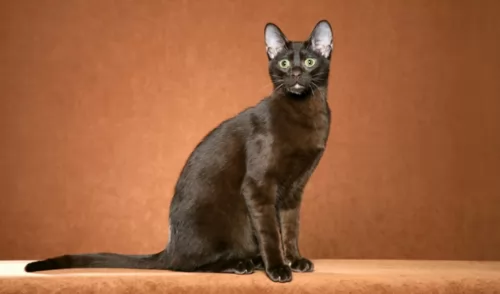 There is a good reason why the Havana Brown cat is so popular. People love the unusually rich brown coat which always has a gleam to it.
There is a good reason why the Havana Brown cat is so popular. People love the unusually rich brown coat which always has a gleam to it.
They also love that this chocolate-colored cat has a wonderful personality and can be a solid companion for humans. So long as you don’t leave him alone for a long time on his own, as that is part of his charm – wanting to be constantly involved with his human family.
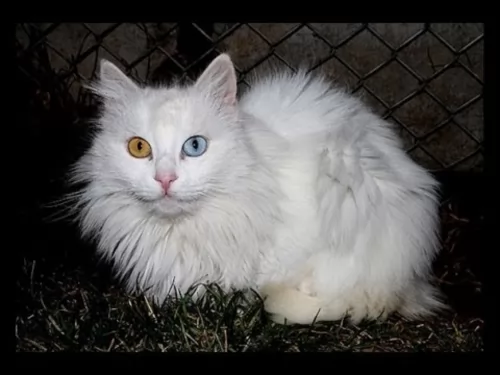 They are lively cats and love playing games with their humans. They will need stimulation from interactive toys. He also loves to leap up onto high perches and watch things from his elevated position.
They are lively cats and love playing games with their humans. They will need stimulation from interactive toys. He also loves to leap up onto high perches and watch things from his elevated position.
If you have decided to have a Van Kedisi in your home, expect things to joyful and entertaining as this cat likes to build a strong bone with his human owners.
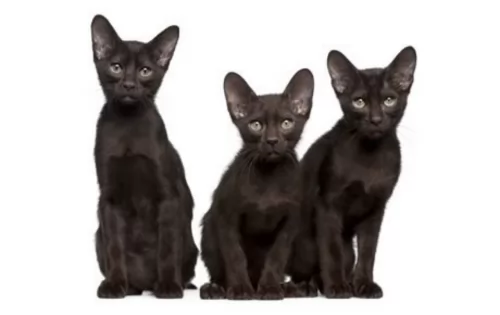 There are no known genetic diseases associated with this breed. They may have a bit of a higher occurrence of gingivitis than other cat breeds, and this thought to come from them having their Siamese ancestry.
There are no known genetic diseases associated with this breed. They may have a bit of a higher occurrence of gingivitis than other cat breeds, and this thought to come from them having their Siamese ancestry.
Beware of bladder stones with your cat which can start at any age. The stones can start off small but can grow larger, rubbing against the bladder walls and resulting in inflammation.
Bladder stones can also lead to blockage of the urethra so that your cat isn’t able to urinate. There are symptoms to indicate your pet may have bladder stones and these can be straining to urinate, painful and little urination, urinary tract infections, and blood in the urine.
This is a time when you want to get your pet to the vet just as soon as possible.
Also, be on the watch for eye infections. Conjunctivitis is one of these to look out for but there are other eye infections your cat can experience. They can come about because of an upper respiratory infection that spreads to the eyes, but they can be caused by any number of things such as bacteria, parasites, and viral infections.
You’ll notice your cat pawing at his eyes and there may even be redness, discharge, and swelling. You vet will be able to treat eye infections with ointments and eye drops.
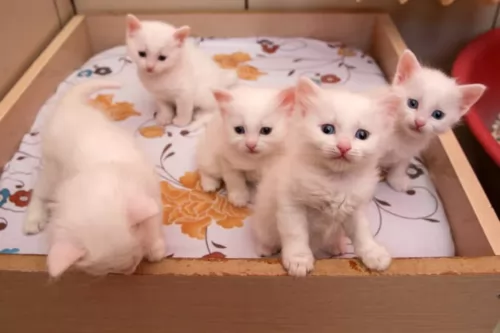 A healthy meat diet for your cat is like a ticket to good health. Cats are carnivores and they rely on you to supply them with food high in protein.
A healthy meat diet for your cat is like a ticket to good health. Cats are carnivores and they rely on you to supply them with food high in protein.
Cats battle to absorb protein derived from plants. Learn to check your food labels to ensure the food contains animal meat. Meat from chicken and tuna is good.
Regular visits to the vet when you suspect that your cat is ill will give you the chance to catch any diseases in their early stages.
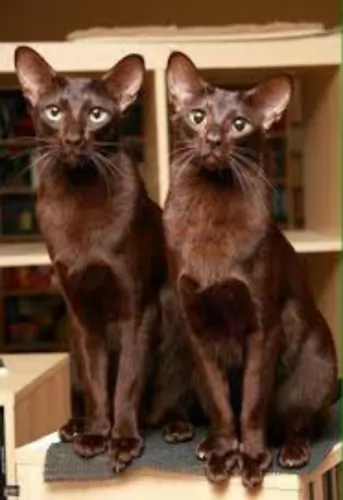 With the cat’s short coat, he experiences little shedding so very little grooming is required. A gentle brush once a week will be enough. These cats love attention and submit easily to a brush and body rub with a soft rubber brush.
With the cat’s short coat, he experiences little shedding so very little grooming is required. A gentle brush once a week will be enough. These cats love attention and submit easily to a brush and body rub with a soft rubber brush.
Check inside the mouth as periodontal disease is a problem with cats. You want to make sure that there aren’t any bad teeth as this can cause a lot of pain.
A vet can also be useful in examining your cat and pinpointing problems.
Check the inside of the ears too because they can become somewhat clogged with wax and dirt. If you don’t want to probe inside the cat’s ears with a cotton ball with warm water and apple cider vinegar, you can take your cat to the vet or to a professional cat groomer.
Keep the litter box of your cat spotlessly clean as these cats are fussy with cleanliness.
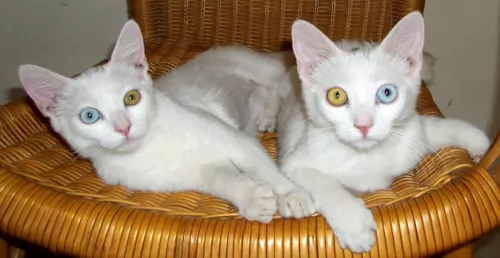 Brush your Van Kedisi each week because the semi longhair can become matted and tangled if not brushed each week.
Brush your Van Kedisi each week because the semi longhair can become matted and tangled if not brushed each week.
The Van Kedisi will need to be vaccinated. As a kitten he will need to be vaccinated against deadly cat diseases. While at the vet he will also be dewormed.
As your cat matures, you will need to make sure that he is free from parasites. Ticks, fleas, and heartworm can cause havoc with your pet and the vet can advise you on a treatment plan.
Have your cat neutered or spayed as not only will it prevent unwanted kittens, but the procedure can have health benefits for your cat too. It can eliminate the possibility of your cat getting some of the many cancers there are. Spaying and neutering also has a positive impact on your cat’s personality.
These are big, strong cats and the temptation will be to overfeed him. They enjoy their food and can easily put on weight. Obesity can bring about many different diseases in your cat.
It is up to you as a responsible cat owner to ensure your ca doesn’t put on a lot of weight but rather maintains a healthy weight. You should also make sure that your feline friend gets regular exercise through playing, walking, and even swimming. These cats enjoy a swim, particularly when it is with their human owners.
Provide your cat with attention and play with him every day. They are playful, intelligent cats and it boosts his morale to have his favorite human playing with him.
Allow opportunities for scratching and climbing. The Van Kedisi loves to climb and scratch – two natural behaviors of cats. Supply him with a scratching post and a climbing tree to get the exercise he needs.